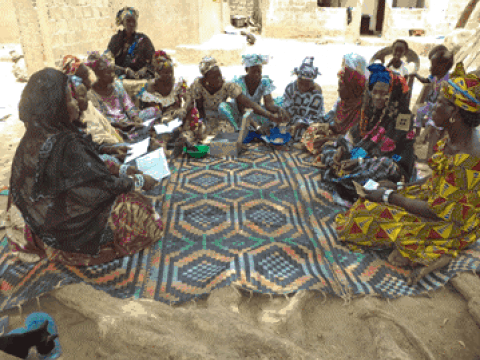Livelihood transformation thanks to interfaith cooperation

Christian and Muslim women in Kaffrine/ Fatick district, differing in worldviews, share a common feature in their livelihood concerns: they both suffer limitations in terms of their economic potentials, operating at levels that contrast with their abilities. Access to credit facilities from conventional microfinance institutions has been limited, and prohibitive interest rates and other harsh conditions imposed by the finance institutions add to the challenge. In addition to these difficulties, the women had to regularly make the 140 km-journey between their district and Dakar, where the finance institutions are located.
The Enhancing Christian Witness in Senegal (ECWS) project has changed the situation for the women in the Kaffrine/ Fatick area by facilitating the establishment of a Village Loan and Savings Association (VLSA) for both groups of women. The project has enhanced the cooperation of Christian and Muslim leaders, helped break down walls of misconceptions and prejudices and eliminated of some constraints and obstacles standing in the way of livelihood development for women of both faiths. A VSLA comprising 20 women has been established in the area and members meet once a week to buy shares at a price determined by the women themselves, based on their own capacity. Each member is allowed to buy between 1 and 5 shares per week and proceeds from these shares are given as credit to members who need it for their businesses. Credit given to members attract minimal interests, the aggregate of which is given back to members at the end of the year as dividends on shares bought.
Mrs. Lobe Mbengue, president of Commission Transformation CDE Naqq Jerinu and member of L’AVEC de Gainth Gouye, Kathiotte ADP, has this narration of her experience with the group, which is typical for many members: “Before VLSA introduction, our savings capacity was very low or even zero. Today, after 6 months of work, I saved almost 35 000 F CFA and my borrowing capacity exceeds 100 000 F CFA. Also, access to credit is easier for me. Before the beginning of this approach, I did several back-and-forth trips between my village and the financial institution based in Kaffrine with additional expenses. Today, through our VLSA, I stay in my village to access credit. Part of the interest I pay to the loan received from VSLA will be returned to me on the sharing of the fund.”
Continuing her narration on further benefits from the approach, she states: “In the past I had to resort to moneylenders who did not hesitate to exploit me financially. Now, our VLSA remains my single financier. My fund has increased substantially and I have more benefit. I'll give you an example, my last credit from VSLA amounted to 100 000 F CFA. With this capital, every Sunday I make an average profit of 15,000 F CFA going to the weekly market of Birkelane, giving an average monthly profit of 60,000 F CFA. After the deduction of monthly interest on the loan, amounting to 10 000 F CFA, I have a net profit of 50,000 F CFA a month without counting what I earn with my other clients. On the social level, the fund strengthened relations between members and a new type of insurance is born with the solidarity fund. All members feel cash net progress financially and thus can better care for their children.”
Dibe Sagne, a member of Fatick VSLA corroborates the benefits of the new innovation introduced through ECWS: “The VLSA approach is very flexible and self-managed by the group. It has freed us from a lot of pressure. We are all active in trading and involvement of small livestock rearing. I also take the opportunity to talk about what the solidarity fund has done for the group. Within the regulations set by the group, there is food support for the most disadvantaged among us. We feel more resilient. Currently, we have a sense of group affection and we bear the burdens of one another. I am truly delighted and thank WV facilitators who accompanied us the whole time.”
Livelihood concerns rank high forevery community and the pressure on women to work out a living with minimal finances for the family has been of major concern to all. The ECWS project through facilitating the establishment of the VLSA, has enabled the transformation of women in the project area through easy access to internally mobilized funds and increased profits. This is thus empowering women of both faiths in the project area to play major roles in the care of their children, thus contributing immensely to the well-being of children.
Author: Jean de Dieu N'Gouala, Faith and Development Projects Coordinator
